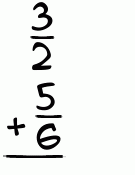What is 3/2 + 5/6?

|
This is how you add
|
||||||||||||||||||
Step 1Our denominators (bottom numbers) don't match, so we can't add yet. Since 2 is evenly divided by 6, we can multiply just one term to get a common denominator. Multiply 3 by 3, and get 9, then we multiply 2 by 3 and get 6. So now our fractions look like this:
|
||||||||||||||||||
Step 2Since our denominators match, we can add the numerators. 9 + 5 = 14 So the answer is:
|
||||||||||||||||||
Step 3Last of all, we need to simplify the fraction, if possible. Can it be reduced to a simpler fraction? To find out, we try dividing it by 2... Are both the numerator and the denominator evenly divisible by 2? Yes! So we reduce it:
Now, try the same number again. Nope. Try the next prime number, 3... Nope. Try the next prime number, 5... No good. 5 is larger than 3. So we're done reducing. Congratulations! Here's your final answer to 3/2 + 5/6
|